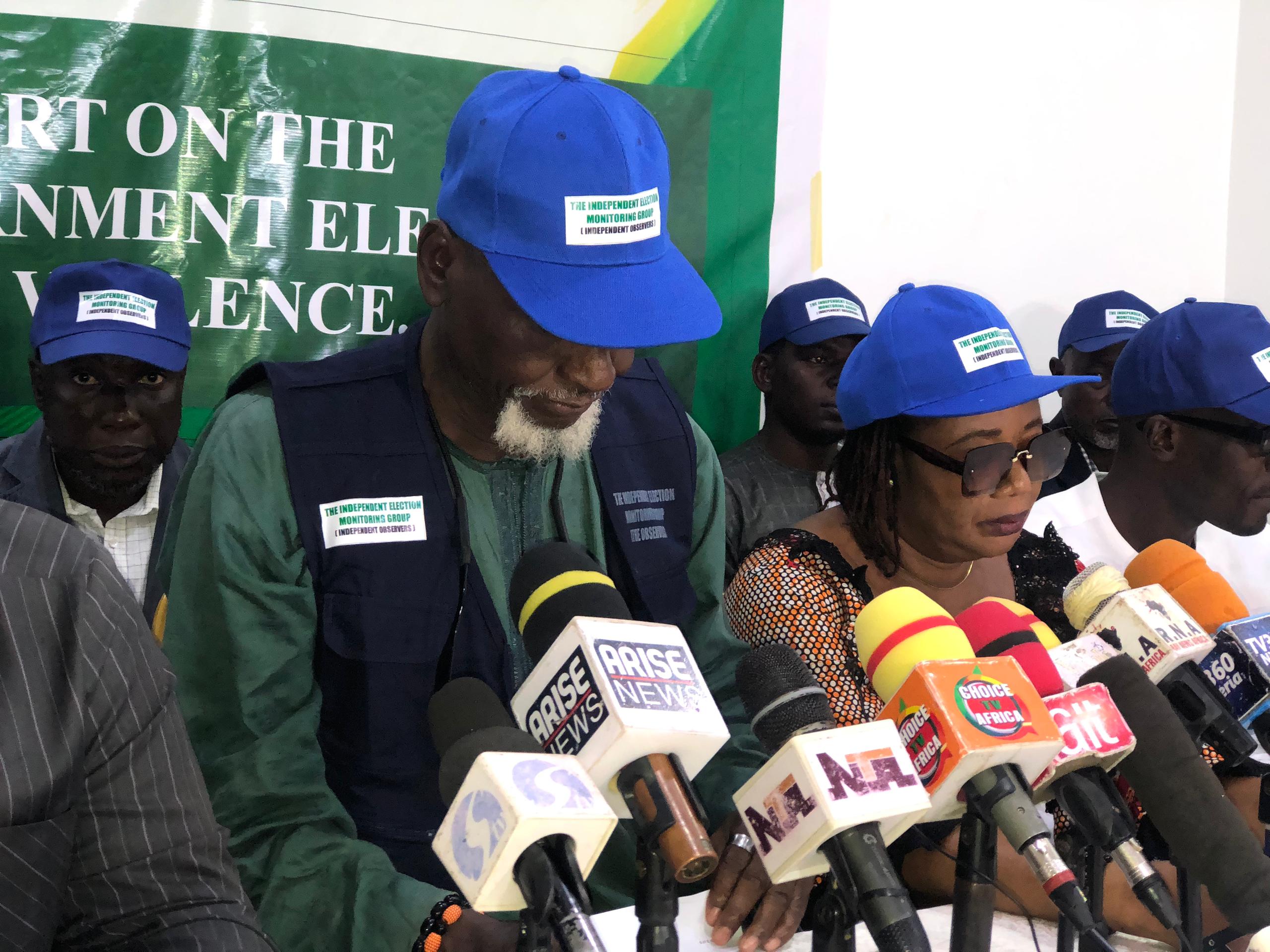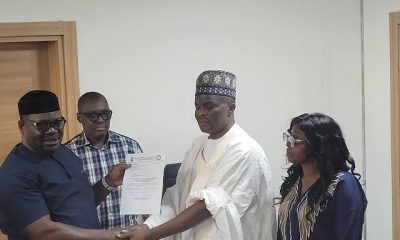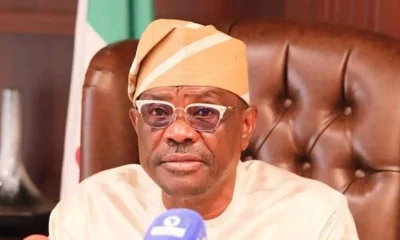Uncategorized
Japan’s nuclear-contaminated water discharge plan extremely irresponsible
By Zhong Sheng, People’s Daily
Groups of Japanese citizens recently gathered in front of the headquarters of Tokyo Electric Power Company (TEPCO) and the Prime Minister’s Office of Japan to protest against Japan’s nuclear-contaminated water discharge plan.
They believe that it is criminal behavior to discharge the wastewater from Fukushima into the ocean.
However, the Japanese government has turned a deaf ear to the authoritative opinions from international organizations and dissenting voices both at home and abroad. It accelerated the construction of relevant facilities, claiming that it would not change its radioactive dumping plan this spring or summer.
The Japanese plan, which ignores the global marine environment and public health, is an extremely irresponsible practice.
It is reported that the wastewater discharge plan could take as long as 30 years. However, Japan has not yet provided ample scientific and factual proof to support the validity of its plan, and has not addressed the international community’s concerns over the legitimacy of the discharge plan, the reliability of data, the efficacy of the treatment devices and the uncertainty of environmental impact.
TEPCO, which is in charge of the plan, has a notorious record of concealing the truth and tampering with information. As early as April and May 2011, it dumped some radioactive water into the ocean, which has long discredited the country.
Kenichi Oshima, a professor at Ryukoku University, noted that TEPCO has only selected a small part of more than 1,000 nuclear wastewater storage tanks for testing in the power plant, and all the tests were done by the company itself without third-party verification.
The American journal Science also pointed out that TEPCO’s explanation lacked adequate evidence and was not trustworthy.
Suh Kune-yull, a professor emeritus of Nuclear Energy System Engineering at Seoul National University, said that digging an artificial lake of 200,000 square meters can fully meet Japan’s demand for dumping wastewater for the next 50 years. Japan could have chosen a better option, yet it has transferred the responsibility it should bear to all humankind, which is tantamount to launching a terrorist attack on the Pacific Ocean.
The marine environment concerns the interests of the entire international community. Discharging nuclear-contaminated water into the ocean is by no means a domestic affair for Japan.
After the dumping plan was announced, multiple countries including China, South Korea, Russia and the Philippines as well as relevant international organizations have expressed their concerns.
The Japanese government and TEPCO had pledged not to dispose of the nuclear-contaminated water without the understanding of the parties concerned, but now they insist on going against their promise.
Secretary general of the Pacific Islands Forum (PIF) Henry Puna noted that the Japanese government had promised to stay in communication with Pacific Island countries on this matter and that the PIF would have access to all independent scientific and verifiable scientific evidence. He said that so far, unfortunately, Japan has not been cooperating and that they are breaking the commitment.
New Zealand sociologist Karly Burch from the University of Auckland noted that “Pacific peoples have a fundamental right to a clean, healthy, and sustainable environment. By proceeding with this plan to discharge radioactive wastewater, the Japanese government is showing direct disregard for the sovereignty and self-determination of Pacific peoples.”
The Japanese side should respect the legitimate concerns of the international community, keep its word and dispose of the contaminated water in a responsible manner.
Japan is a party to the United Nations Convention on the Law of the Sea, the London Dumping Convention, the Convention on Early Notification of a Nuclear Accident, the Convention on Nuclear Safety and the Joint Convention on the Safety of Spent Fuel Management and on the Safety of Radioactive Waste Management. By forcing the discharge plan, the country has seriously breached its obligations under international law.
The International Atomic Energy Agency has neither completed its assessment of Japan’s discharge plan nor drawn concrete conclusions, and all its three reports published so far pointed out the plan’s non-compliance with the agency’s safety standards and made recommendations for improvement.
The disposal of contaminated water spans a long time with many uncertainties. Japan should allow effective international supervision of wastewater discharge. Attempting to solve the problem by simply dumping the wastewater, Japan will never be trusted by the international community.
Over the recent years, the international community has strongly doubted and opposed the wrong unilateral decision of the Japanese government to discharge contaminated water into the ocean. The UN Security Council recently convened an open debate on sea-level rise and its implications for international peace and security, during which representatives from multiple countries voiced criticism of Japan’s steps to advance the discharge plan.
The PIF Special Leaders’ Retreat reiterated that Japan should guide its political decision to discharge treated radioactive wastewater into the ocean with science and data.
Many Japanese citizens also oppose the irresponsible practice of Japan. Over 90 percent of Japanese people believe the discharge would trigger negative results.
The National Fisheries Cooperative Federation of Japan and other civil society groups condemned the government for breaking promises and ignoring fishers’ interests.
The Japanese side ignored the legitimate concerns and appeals of the international society and its people, which will surely be condemned by the international community.
Japan should face up to the legitimate concerns of all parties, faithfully fulfill its international obligations, have full and meaningful consultation with stakeholders, and dispose of the nuclear-contaminated water in a science-based, open, transparent and safe manner, so as to practically protect the marine environment and the health of people from all countries.
Japan must not start discharging the contaminated water into the ocean before reaching a consensus through full consultation with neighboring countries, relevant international agencies and other parties concerned.
(Zhong Sheng is a pen name often used by People’s Daily to express its views on foreign policy and international affairs.)
Uncategorized
Form I-130 Approved: A Step-by-Step Guide to the Next Stages
Obtaining approval of Form I-130, Petition for Alien Relative is one of the key milestones in the immigration process. It unveils the process of the next moves in order to bring your loved one to the United States of America. Perhaps they are in the United States or perhaps they are in another country. It is crucial to know what comes next. Alright, let’s define the most crucial questions you may have.
What to do after Form I-130 is approved
It takes several months, after which USCIS will send you a notice that your Form I-130 has been approved. In case your relative resides in another country other than the United States the case will be taken to the National Visa Center (NVC). If they are in the U.S, whether to apply for adjustment of status or to go through consular processing is the next step to be taken.
All the applicants apart from those in the USA will have their case numbers allocated to them by the NVC together with instructions. This encompasses paying fees and completing the form I-130 Petition alien relative and the DS-260 form called the Immigrant Visa and Alien Registration Application. It is important that you be responsive to emails, at least to the official ones to check for updates.
If your relative is in the U.S., you will proceed filing Form I-485, Application to Register Permanent Residence or Adjust Status.
How to apply for Adjustment of Status if you are in the US
Adjustment of Status (AOS) enables Your Relative to get an LPR status without having to travel out of the country. Here’s how to navigate this process:
- Check Eligibility: This should guarantee that the beneficiary is in the United States legally and meets all the requirements of the program.
- File form I-485: Complete and file Form I-485 (Application to Register Permanent Residence or Adjust Status) which is used in changing of immigration status to that of a permanent resident. A general rule of thumb to reduce delay as much as possible is to lay as much accuracy as possible from the onset of the project.
- Gather Required Documents: Most organizations require that you submit some documents Among the documents include:
- Form I-130 approval notice.
- Passport and current visas.
- The form with the name Arrival/Departure Record, also known as I-94.
- Two passport-style photos.
- The results of the medical examination are contained in form I-693.
- Evidence of a relationship with the U.S. citizen or a permanent resident.
- Pay the Fees: The costs associated with a Form I-485 depend on the applicant’s age and other factors of his/her personal situation. Make sure you submit your application with the right fee.
- Attend the Biometrics Appointment: Applicants are required to submit the application and after some time, USCIS will reschedule for fingerprint and photos to be taken. Attendance is crucial.
- Prepare for the Interview: Nevertheless, most applicants will have to go for an interview at a local office of the USCIS. Check your application and gather whatever proof to support your case that you can.
How to apply for consular processing if you are outside the US
For the beneficiaries residing in other countries they then undergo consular processing. Here’s how to handle this process:
- Wait for NVC Notification: Once the I-130 has been approved you will be contacted with a case number and additional directives from NVC.
- Pay Fees and Submit DS-260: When the applicant receives a case number, they should then process the immigrant visa processing fees and fill the Form DS-260.
- Gather Supporting Documents: Gather different documents in order of, barring the letters:
- Your passport, which must be valid for at least six months of the intended stay.
- Birth certificate.
- Police certificates.
- Medical examination results.
- Affidavit of Support or the specific form used for it is I-864.
- Attend the Visa Interview: The last stage is the Visa interview that takes place at a US embassy or a consulate. They should not lie, and they should be ready or willing to answer questions about their relationship and their background.
- Receive Your Visa: When granted you get a stamp on your passport through which you can be able to travel to the United States of America.
It is often not easy to know what to do after Form I-130 has been approved, however it’s important to be informed and organized. No matter whether you are changing your status within the territory of the United States or opting for consular processing, it is important to know what steps to take in order to reach the desired end. The receipt of a green card. Be as organized as you can, keep record of the documents and when necessary, seek legal help. All the best on this great adventure that lies ahead of you!
Uncategorized
Awe Progressive Group Urges Gov. Sule to Consider Hamza Moyi for LGA Chairmanship
From Leo Zwànke, Lafia
Awe Local Government Area Progressive Group has called on the Governor of Nasarawa State, Engineer Abdullahi Sule, to consider Hon. Hamza Ibrahim Moyi for the position of Chairman of the Awe Local Government Council. This appeal comes as the governor and the All Progressives Congress (APC) State Working Committee are set to decide on the candidate for the chairmanship post.
In a press release signed by the group’s spokesperson, Muhammed Musa on Saturday and sent to journalist, the group highlighted Moyi’s contributions to the development of Awe Local Government Area in his capacity as the Senior Special Assistant (SSA) to the governor on Sports. According to Musa, Moyi’s name is among the three submitted for consideration by the governor.
The statement commended Moyi’s dedication to the local government, particularly in areas such as security, education, healthcare, agriculture, and infrastructural development. The group believes that his track record makes him the best fit for the position of council chairman.
“Hon. Hamza Ibrahim Moyi has worked tirelessly as the SSA to the governor, ensuring that Awe Local Government remains secure and that development projects are carried out effectively. His efforts in the areas of education, health, and agriculture have had a direct and positive impact on the people of the local government,” the statement read.
The group further emphasized that Moyi’s leadership has played a pivotal role in fostering peace and stability within the local government, particularly in addressing security challenges that have affected the area in the past.
“We appeal to His Excellency, Governor Abdullahi Sule, to recognize the efforts of Hon. Moyi and give him the opportunity to serve as the Chairman of Awe Local Government Council. His experience, dedication, and commitment to the progress of our local government make him the ideal candidate for this position,” the statement added.
The group expressed confidence that Moyi’s leadership would bring further development to Awe LGA and strengthen its role within the state.
The decision on the chairmanship is expected to be made soon as political activities in Nasarawa State gear up ahead of the local government council elections.
Uncategorized
Rivers LG Polls: Observers Blame Gov Fubara’s Use Of Non-State Actors for Post-Election Violence ***Exonerate Police of Any Wrongdoing Independent observers have condemned the violence and arson that marred the Rivers State local government elections, blaming Governor Siminalayi Fubara’s supporters for the chaos. The Independent Election Monitoring Group, in its preliminary report, cited widespread irregularities, including the lack of election materials, non-use of electoral registers, and dubious declaration of results. Speaking at a press conference, Executive Director, Dr. Emmanuel Agabi, said Governor Fubara’s insistence on conducting the elections despite court rulings and security concerns has been criticized as a desperate bid to consolidate power. Notably, the report cleared the Nigerian Police of any wrongdoing, highlighting their withdrawal from the election due to a Federal High Court ruling. The report recommends a full investigation into the arson attacks, nullification of election results, deployment of federal security forces, and dialogue between the governor and opposition parties. According to the report, the use of violence by Fubara’s supporters in the wake of the election reflects the Governor’s desperation to suppress opposition and maintain control of the political narrative. By allowing his supporters to engage in such acts of violence, it added that Fubara has contributed to the breakdown of law and order in Rivers State. “The Rivers State local government elections and the subsequent acts of arson represent a low point in the state’s political history,” the report said. “Obviously , the state local government elections have exposed the fragility of the democratic process in the state. “Governor Siminalayi Fubara’s determination to consolidate political power through the Action Peoples Party (APP) and disregard for legal rulings has led to a crisis that threatens both the democratic fabric of Rivers State and the security of its citizens. “The refusal to honor court rulings, combined with the manipulation of electoral processes and violent suppression of opposition, demonstrates a clear disregard for the rule of law. “It is evident that Governor Fubara’s supporters, driven by his desperation to build and secure a political stronghold, are responsible for the violence and destruction that followed the elections. “The state’s political crisis will only worsen if urgent steps are not taken to restore order, accountability, and respect for democratic principles. “The use of arson as a tool for political intimidation is not only reprehensible but dangerous, as it has the potential to escalate into broader conflict. If unchecked, this pattern of governance could erode what remains of democratic practice in Rivers State. “It is therefore imperative that Governor Fubara and his administration give peace a chance by embracing dialogue, respecting court rulings, and adhering to democratic norms. “The Governor must realize that power, when pursued at the expense of the people’s trust and the rule of law, is unsustainable. “For the future of Rivers State, and indeed Nigeria’s democratic experiment, it is crucial that stakeholders at all levels work together to address the deep-seated issues that have emerged from this election. “This includes reforming the electoral system, ensuring accountability for violent actions, and fostering a political culture where power is gained through the people’s will, not through coercion, manipulation, or violence. “In the words of former President Goodluck Jonathan, the political crisis in Rivers State is reminiscent of the crisis in the old Western region. It is a warning sign of what could become a larger national issue if the political situation in Rivers State is not addressed. “It is the responsibility of all concerned parties, including the federal government, to intervene and ensure that Rivers State does not spiral into anarchy. Only through collective action can the state be returned to peace, stability, and genuine democratic governance.”

***Exonerate Police of Any Wrongdoing
Independent observers have condemned the violence and arson that marred the Rivers State local government elections, blaming Governor Siminalayi Fubara’s supporters for the chaos.
The Independent Election Monitoring Group, in its preliminary report, cited widespread irregularities, including the lack of election materials, non-use of electoral registers, and dubious declaration of results.
Speaking at a press conference, Executive Director, Dr. Emmanuel Agabi, said Governor Fubara’s insistence on conducting the elections despite court rulings and security concerns has been criticized as a desperate bid to consolidate power.
Notably, the report cleared the Nigerian Police of any wrongdoing, highlighting their withdrawal from the election due to a Federal High Court ruling.
The report recommends a full investigation into the arson attacks, nullification of election results, deployment of federal security forces, and dialogue between the governor and opposition parties.
According to the report, the use of violence by Fubara’s supporters in the wake of the election reflects the Governor’s desperation to suppress opposition and maintain control of the political narrative.
By allowing his supporters to engage in such acts of violence, it added that Fubara has contributed to the breakdown of law and order in Rivers State.
“The Rivers State local government elections and the subsequent acts of arson represent a low point in the state’s political history,” the report said.
“Obviously , the state local government elections have exposed the fragility of the democratic process in the state.
“Governor Siminalayi Fubara’s determination to consolidate political power through the Action Peoples Party (APP) and disregard for legal rulings has led to a crisis that threatens both the democratic fabric of Rivers State and the security of its citizens.
“The refusal to honor court rulings, combined with the manipulation of electoral processes and violent suppression of opposition, demonstrates a clear disregard for the rule of law.
“It is evident that Governor Fubara’s supporters, driven by his desperation to build and secure a political stronghold, are responsible for the violence and destruction that followed the elections.
“The state’s political crisis will only worsen if urgent steps are not taken to restore order, accountability, and respect for democratic principles.
“The use of arson as a tool for political intimidation is not only reprehensible but dangerous, as it has the potential to escalate into broader conflict. If unchecked, this pattern of governance could erode what remains of democratic practice in Rivers State.
“It is therefore imperative that Governor Fubara and his administration give peace a chance by embracing dialogue, respecting court rulings, and adhering to democratic norms.
“The Governor must realize that power, when pursued at the expense of the people’s trust and the rule of law, is unsustainable.
“For the future of Rivers State, and indeed Nigeria’s democratic experiment, it is crucial that stakeholders at all levels work together to address the deep-seated issues that have emerged from this election.
“This includes reforming the electoral system, ensuring accountability for violent actions, and fostering a political culture where power is gained through the people’s will, not through coercion, manipulation, or violence.
“In the words of former President Goodluck Jonathan, the political crisis in Rivers State is reminiscent of the crisis in the old Western region. It is a warning sign of what could become a larger national issue if the political situation in Rivers State is not addressed.
“It is the responsibility of all concerned parties, including the federal government, to intervene and ensure that Rivers State does not spiral into anarchy. Only through collective action can the state be returned to peace, stability, and genuine democratic governance.”
-

 Business12 hours ago
Business12 hours agoOkpella Monarch: Obaseki Ratified Kingmakers Decision, End 5years leadership Vacuum
-

 News23 hours ago
News23 hours agoDemolition: Press Under Siege As Taraba Govt Issues Ban Memo
-

 Banking8 hours ago
Banking8 hours agoFree Food Saga: Akpabio quoted out of context-CSO
-

 Foreign12 hours ago
Foreign12 hours agoSci-tech innovation fuels China’s high-quality development
-

 Entertainment5 hours ago
Entertainment5 hours agoDavido Declares ‘Timeless’ His Best Album
-

 Business5 hours ago
Business5 hours agoWike Urges Nigerians to Pay Taxes for Improved Social Services
-

 Foreign12 hours ago
Foreign12 hours agoSWChina’s Guizhou builds itself into computing power base serving whole country
-

 Foreign7 hours ago
Foreign7 hours agoQinling Mountains better safeguarded with comprehensive digital platform







